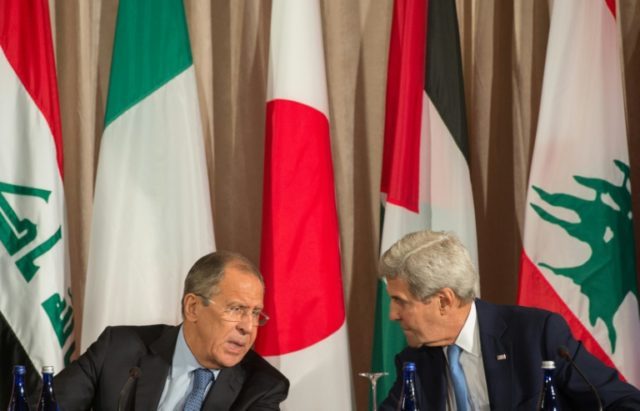Washington (AFP) – Despite repeated setbacks on the path to peace in war-wracked Syria, world and regional powers will give diplomacy another chance in weekend talks in Europe, organized by the US and Russia, to try to secure a ceasefire that sticks.
Washington and Moscow, which officially cut off bilateral contact on the issue last week after a truce deal unraveled, on Wednesday announced two days of talks — in Lausanne on Saturday, and in London on Sunday.
The meetings come after Syria was plunged into some of the worst violence it has seen, as government forces backed by Russian airpower push a brutal assault on rebel-held eastern Aleppo.
Fresh air strikes and artillery fire in Aleppo on Wednesday left at least seven people dead, an international monitor said, a day after Russia was accused of stepping up its raids on the city.
They also come with tensions high between Moscow and the West, which has accused Russia of potential war crimes over its bombing campaign.
In the Swiss city, US Secretary of State John Kerry and Russian Foreign Minister Sergei Lavrov should be joined by their counterparts from Turkey and Gulf countries.
Lavrov named Turkey, Saudi Arabia and Qatar — all backers of Syrian opposition forces — as possible participants. But neither side confirmed an invitation to Iran, a key player in the conflict and an ally of Syrian President Bashar al-Assad.
Then in London, Kerry will likely meet up with his European counterparts — from Britain, France and Germany.
Both meetings will focus on “a multilateral approach to resolving the crisis in Syria, including a sustained cessation of violence and the resumption of humanitarian aid deliveries,” the State Department said Wednesday.
In Moscow, Russian President Vladimir Putin “expressed the hope that the meeting set for October 15 in Lausanne… will be productive and contribute in a concrete way to a resolution” of the conflict, the Kremlin said.
French President Francois Hollande and German Chancellor Angela Merkel urged Putin to push for a ceasefire, despite the repeated setbacks.
Lavrov, meanwhile, told CNN in an interview Wednesday that he hoped the weekend talks in Switzerland could help “launch a serious dialogue” based on the now-defunct US-Russian pact.
“We would like to have a meeting in this narrow format, to have a businesslike discussion, not another General Assembly-like debate,” Lavrov said.
– No ‘blackmail’, Putin says –
The United Nations said Syria envoy Staffan de Mistura had been invited to take part in the talks but a spokesman said he did not know if he would attend.
Hopes are rather low for a breakthrough to end the five-year conflict that has claimed some 300,000 lives.
The West has accused Russia of potential war crimes over its bombing campaign in Aleppo — claims Putin dismissed as “political rhetoric.”
Some have even called for punitive measures against Moscow, though French Foreign Minister Jean-Marc Ayrault cautioned against “a cycle of sanctions for the sake of sanctions.”
Russia has responded by bolstering its forces in the war-torn country.
Putin on Wednesday warned Western countries against imposing sanctions, stressing that Russia would not let itself be isolated.
“We should not go down the path of pressure and blackmail but search for compromise,” Putin said at an investment forum in Moscow.
“I have said one hundred times that we are ready to search for these compromises. We would very much like that our partners treat us this way.”
He also placed blame on the West for the dire situation.
“I am deeply convinced that it is our Western partners, first and foremost of course the United States, who are responsible for the situation,” he told France’s TF1 television in an interview broadcast Wednesday.
– Papal plea –
Putin earlier this week cancelled a long-planned visit to France after Hollande insisted they discuss Syria, and on Wednesday slammed Paris for presenting a UN proposal on Aleppo at the weekend that Russia vetoed.
“They put forward the resolution knowing that it would not pass… in order to incite a veto,” Putin said.
“Why? It was aimed at inflaming the situation and fanning hysteria around Russia.”
The Lausanne talks will mark the first meeting between Kerry and Lavrov since the two countries froze talks on October 3, after the ceasefire they brokered quickly crumbled.
Washington and Moscow have traded blame in subsequent days, but in fact, the negotiations never really stopped, with Kerry and Lavrov speaking by telephone in recent days.
State Department spokesman John Kirby said Wednesday that for Kerry, the bilateral talks had been suspended but were “not dead.”
The United Nations has warned of the unfolding humanitarian catastrophe taking place in Aleppo, saying that the rebel-held territory could be destroyed entirely by the end of the year.
Pope Francis appealed on Wednesday for an immediate ceasefire in Syria, calling for “at least” a truce enabling civilians, especially children, to be evacuated, after Aleppo came under fierce air assault.

COMMENTS
Please let us know if you're having issues with commenting.